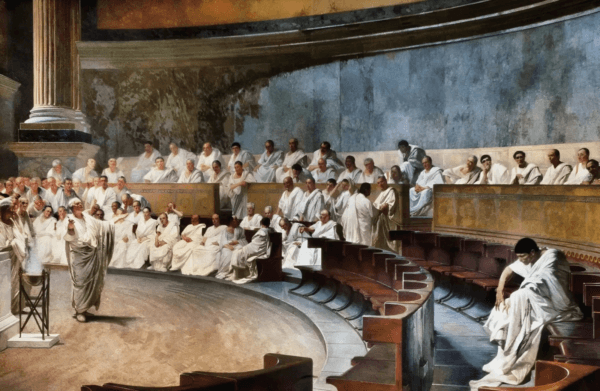Commentary
America’s first founding principle reveals the often overlooked yet vital foundation of the entire U.S. Constitution.
First, I want to provide a brief disclaimer. This is my interpretation of the principle, shaped by multiple readings of W. Cleon Skousen’s book “The Five Thousand Year Leap”; many interviews with his son, professor Paul Skousen; and my own thoughts and observations. If you’re interested in the original principles, I recommend reading that book.
The Founding Fathers believed that government should be based on natural law. However, few people today fully understand what that means.
The clearest explanation of natural law was given by Marcus Tullius Cicero, a Roman statesman and jurist from ancient Rome.
The Founding Fathers did not create these ideas in isolation. They learned from the wisdom of ancient Israel, Greece, and Rome, and England. Among the sages that influenced them were Cicero, ancient Greek historian Polybius, English philosopher John Locke, Scottish economist Adam Smith, and French political thinker Montesquieu.
Among these thinkers, Cicero stands out.
Cicero and Natural Law
Cicero (106 B.C. to 43 B.C.) was a Roman statesman, orator, lawyer, and philosopher. As a consul of the Roman Republic, he was a steadfast defender of republicanism and opposed the rise of the empire. Eventually, he was assassinated by soldiers sent by Mark Antony, one of the last “triumvirs.” Cicero left behind immortal works such as “De Re Publica” (“On the Republic”) and “De Legibus” (“On the Laws”), which envisioned future societies based on natural law.
Cicero believed that a society built upon natural law would conform to the will of the Creator. He held that the immense universe was created by God, and that God’s wisdom and will represent the law of the universe—or natural law.
Natural law is universal, spontaneous, knows no national or regional boundaries, is irrefutable, and cannot be denied by man.
The will of the Creator is often reflected through religious texts, such as the Bible and the scriptures of Buddhism and Taoism. Additionally, natural law can be perceived through human reason and common sense. For example, humans universally recognize principles such as “one shall pay with their life if they murder” and “parents must be honored and cared for by their children.”
No matter how natural law is recorded or felt, its constants are goodness, universality, adherence to objective truth, comprehensibility, and earthly morality.
Cicero also believed that humans differ from animals because the Creator made man in his image, endowing humans with reason and deduction. This rationality enables humans to solve problems and govern wisely. When wisdom is applied in government, it leads to “just government.” According to Cicero, a society organized through mutual agreement based on natural law constitutes “the state.”

"Cicero Denounces Catiline," 1880, by Cesare Maccari. Fresco. Palazzo Madama, Rome. (Public Domain)
Cicero lived about 100 years before Jesus Christ, yet they both emphasized two fundamental natural rules: Worship the Lord and love your neighbor as yourself.
In Cicero’s view, not every law created by humans is just. Only those in accordance with natural law—or God’s law—are good laws.
The Founding Fathers of the United States, inspired by Cicero, believed that America must be a moral and virtuous society grounded in natural law in order to avoid the depravity and corruption that had characterized so many past nations.
Manifestations of Natural Law
So, how does natural law manifest itself? Here are some examples:
- Inalienable rights, with life being the most basic. These include the right to property and the right to create wealth.
- The right to be tried in accordance with the law. People cannot be arbitrarily arrested or convicted of a crime.
- The right to be free from harm.
- The right to enter into contracts.
- The right to protect family and marriage.
- Parental responsibility and the right to educate children.
- The right to reciprocal compensation.
- The right to own weapons for self-defense.
- The right not to be taxed without representation.
- The principle that limited government is essential to prevent tyranny.
- The principle that the separation of powers, with checks and balances, is necessary to stop the abuse of power.
In fact, the U.S. constitutional system is founded on these natural law principles.
As Thomas Jefferson wrote in the Declaration of Independence, “We hold these truths to be self-evident, that all men are created equal, that they are endowed by their Creator with certain inalienable rights, that among these are Life, Liberty, and the Pursuit of Happiness.”
These declarations stem from the principles of natural law. We cannot discuss any other founding principles without understanding this most fundamental point.
In the next installment, I will discuss the second founding principle: “A free people cannot survive under a republican constitution unless they remain virtuous and morally strong.”













